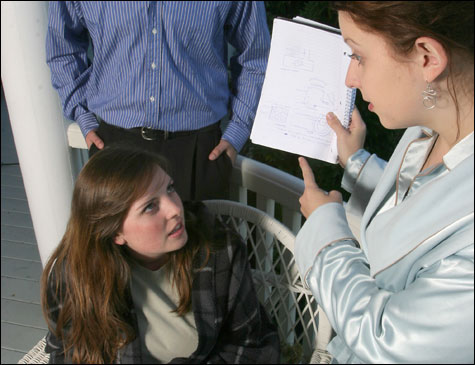
SHOW, DON'T TELL USM's cast shine in a Pulitzer-winning play.
|
Short + sweet
Children's Theatre returns
Ahoy! Bringing lots of swashbuckling shenanigans to Portland’s younger theater-goers is an auspicious new partnership: The Children’s Theatre of Maine, in collaboration with the Children’s Museum of Maine, now presents Odd at Sea, a seafaring tale of Captain Odd, his wily buccaneers, mermaids, Cyclops, a sea monster, and other creatures of the deep. Under the direction of new CTM Artistic Director Reba Short, Christine Klein’s play includes an all-kid cast, and is scheduled to run through October 14 in either the Museum’s Dress-Up Theater or, weather permitting, the outdoor pirate ship in back. Tickets are $5; call 207.878.2774.
_MG
|
It starts with x. Assign it a value, let it equal something — a number, a rate, a relation. Take that x, and subject it to a litany of whims, contortions, losses, and laws, all in the service of expressing some confounding phenomenon. With purpose and careful reason, the epic of our x becomes a proof. Carried to its logical conclusion, it will prove something that we know, or think we know, but cannot explain. It will reveal a mathematical harmony — a perfect answer — and render the chaos of our world elegant, explicable.
This is a higher order of math, ambitious and lyrical, and it absorbs the characters of Proof, a Pulitzer-winning drama by David Auburn, now on stage in a powerful production of USM’s Theatre Department, under the direction of William Steele. Twenty-five-year-old Catherine (Slaney Rose Jordan) is the daughter of a renowned mathematician, Robert (Ian Carlsen), and was raised in the presence of much beautiful mathematics. She has inherited some measure of her father’s brilliance (and, possibly, his madness), but when his final years were ravaged by dementia, she put aside college and her own work. Now, sullen and sad just before his funeral, she’s visited by Hal (Bobby Trask), a former student of her father’s, and her uppity sister Claire (Stacy Ann Strang), who wants her to move to New York. Catherine, like the others, yearns for it all to make beautiful sense.
Catherine’s story takes place in early autumn and winter outside her and her dad’s run-down house, a landscape where set designer Jesse Pilgrim makes the chill and the decline gently manifest in pale, fading yellows and sprawling, just-dying vines. There’s a bracing frankness to Jordan’s keen and beautifully nuanced Catherine as she stalks and slumps out here, her acuity as sharp as newly cold air. Auburn’s script moves Catherine back and forth in time, before and after Robert’s death, and Jordan handles this with startling verisimilitude, flashing us back to inklings of the bitter edge that we have already seen will become entrenched.
Catherine’s relationship with Robert is one almost more of peers than of daughter and father, and both Jordan and Carlsen do well with the tensions and restraints that accompany their unique love. Carlsen here has the distinct challenge of playing a man about twice his age. Make-up and wardrobe suggest a gaunt pallor of age, and Carlsen’s physical portrayal — slow, creaky, sometimes shaky — is fine work. The one thing that betrays his youth is his voice — robust and actorly — which often feels far too strong. Still, he delivers some astonishing breaking points, as when Robert’s self-awareness suddenly returns, agonizingly, as he forces Catherine to read aloud from his mad last work. “Let x equal the cold,” she reads, starkly, and in the chill of the human chaos that’s seeped into his science, Carlsen’s Robert crumbles, shivers, weeps.
As far as math and madness go, Claire is the odd one out, and could easily be played as a caricature of the superficial consumer class. But Strang's pursed mouth also makes us aware that Claire realizes her limitations, and that her anal nit-picking and obsessions about kitchenware and jojoba conditioner are simply her own strategy for dealing with her own desperate need for order.
It’s with Trask’s charmingly awkward, earnest Hal that the bulk of Catherine’s transformation happens, and he and Jordan share remarkably deft timing, with a rapport that evolves compellingly. Watch the subtle shifts in Trask’s composure as Hal slowly realizes the genius of his professor’s daughter — his infinitesimal stutter as she rattles off the longest Germain prime, his longer and more frequent gazes at her after he speaks. Watch Catherine watching him, and slowly loosening, warming.
And ah, the heat and joy of these two, the young guard of mathematics, as they swoon together over the graceful salvations of their proofs. In their love is the best hope in the human urge for order, as they express their own lovely forms against the rest of the chaos and the cold.
Proof | by David Auburn | Directed by William Steele | Produced by the University of Southern Maine’s Theatre Department | at Russell Hall in Gorham | through October 14 | 207.780.5151
Email the author
Megan Grumbling:
mgrumbling@hotmail.com